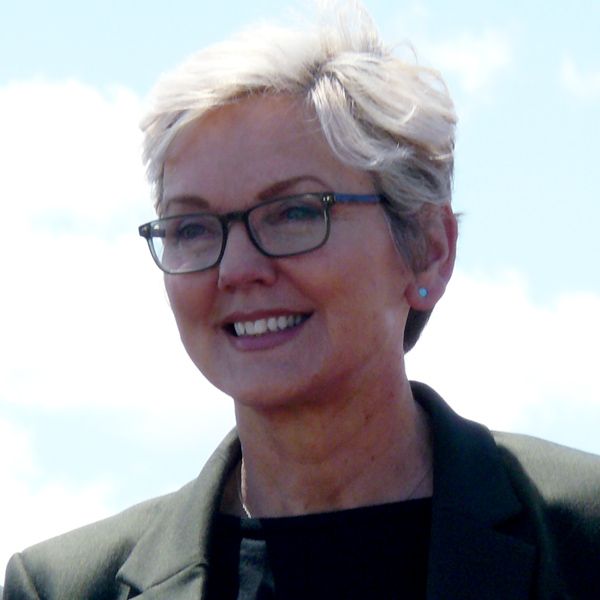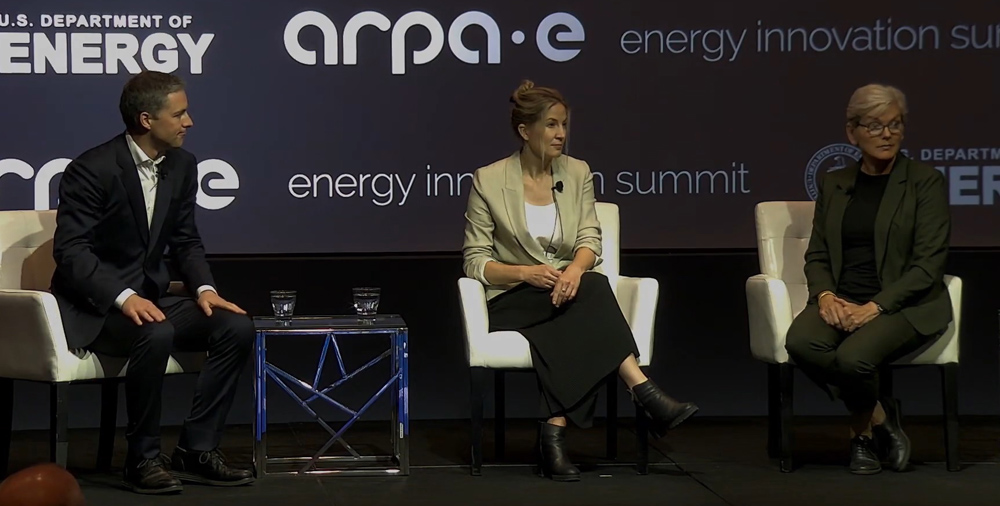
DENVER — Leaders in energy innovation from across the U.S. traveled to Denver last week to participate in ARPA-E’s 2022 Energy Innovation Summit.
The three-day conference ended with a fireside chat led by U.S. Secretary of Energy Jennifer Granholm.
Granholm started by expressing her excitement to be back in person.
“Since the last time we met virtually, so much has gone on in the world, even yesterday, so much horrible stuff,” Granholm said, referring to the school shooting in Uvalde, Texas.
 U.S. Energy Secretary Jennifer Granholm | © RTO Insider LLC
U.S. Energy Secretary Jennifer Granholm | © RTO Insider LLC“[And] the war in Ukraine as well,” she continued. “The impacts on the global energy markets and the fact that gas prices are through the roof and people are really hurting. It just tells you that we have got to move.”
Granholm expressed frustration with the current legislature’s inability to “get the full array of our climate policy through,” but she said she remains optimistic.
“Technology is going to move forward regardless of what’s happening on the policy side, and this is how we are going to ultimately fix the biggest problems that are facing us,” she said.
Beth Zotter, CEO and co-founder of UMARO Foods, and Natron Energy CEO Colin Wessells joined Granholm for a conversation about the technologies their companies are working on to aid the transition to net zero.
Zotter’s company started out by producing algal biofuels out of seaweed to use in the transportation sector.
“UMARO Foods is really built on the vision that the ocean is the most scalable and efficient bioreactor for producing biomass,” Zotter said. She added that the company’s goal is to create the technologies that can unlock the ocean’s potential for producing clean energy.
Her company has moved into the food industry, using seaweed biproducts to produce plant-based foods to complement its existing biofuel production. UMARO plans to roll out plant-based bacon to restaurants in the coming months.
“Right now, algal biofuels need a high-value co-product to basically make the economics for large-scale biorefineries work out,” Zotter said. And with a growing demand for plant-based meat alternatives, it’s a new market opportunity, she added.
On the battery storage front, Wessells said, “Natron Energy is developing sodium-ion batteries to solve electricity reliability problems,” while avoiding widespread industry supply chain issues.

“We’re removing the supply chain constraints,” he said. “We don’t have the lithium; we don’t have the cobalt; we don’t have the nickel; we don’t have the copper. We can onshore all these materials. We just use iron; we just use manganese.”
Natron is planning a large battery storage project in Holland, Mich., with its new sodium-ion technology. It plans to run about 600 MW of battery production per year of utility-scale grid storage for “data centers, telecom [and] short-duration grid storage. … This will be phase one of a longer-term growth plan,” he said.
With LG Energy Solutions’ investment in battery manufacturing for electric vehicles in March and the various auto manufacturers in the area, Wessells said Holland is poised to become a battery hub in the Upper Midwest.
Wessells said Natron’s goal is “to avert a doomsday scenario for grid storage, where if we don’t have the lithium minerals, we don’t have the grid storage we need.” Being independent of the mineral supply chain may allow Natron to fill the battery storage gap that will get the U.S. to net zero, he said.
Both companies were able to launch with help from funds awarded through ARPA-E grants. Granholm stressed the importance of government working with industry to fund technologies to avert climate change and aid the energy transition.


